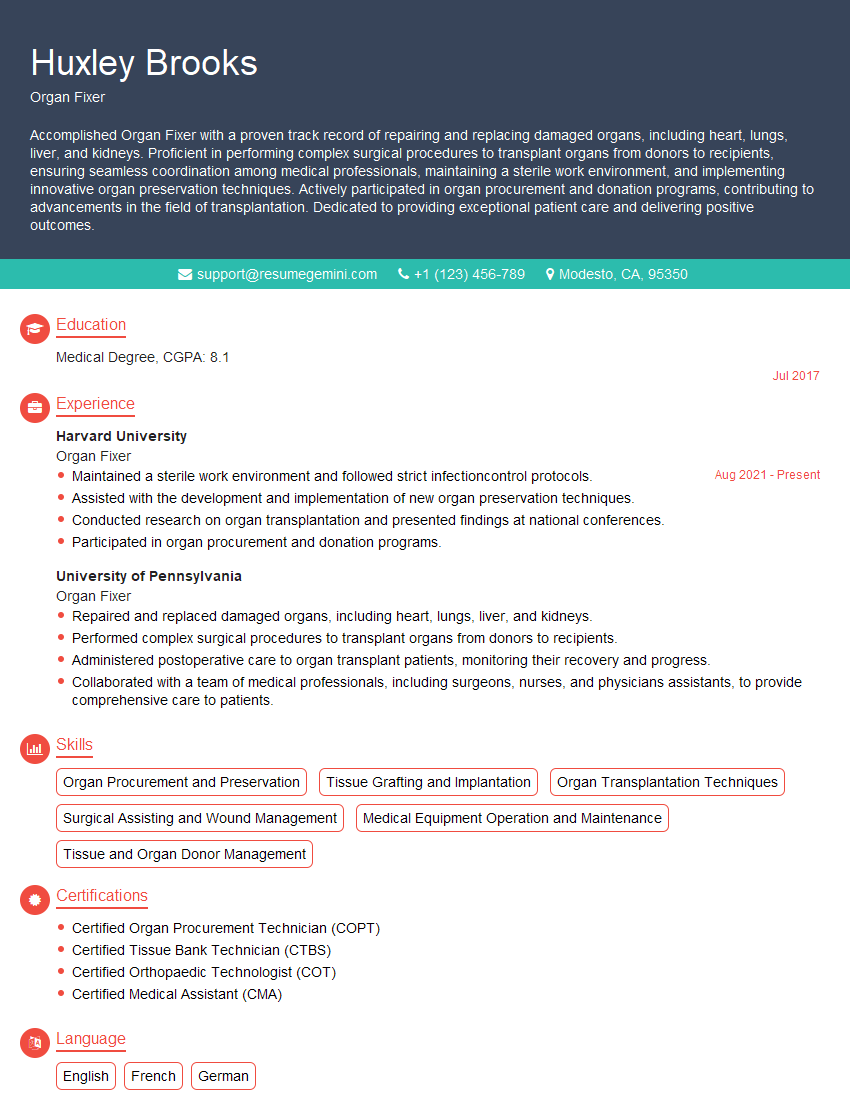Are you a seasoned Organ Fixer seeking a new career path? Discover our professionally built Organ Fixer Resume Template. This time-saving tool provides a solid foundation for your job search. Simply click “Edit Resume” to customize it with your unique experiences and achievements. Customize fonts and colors to match your personal style and increase your chances of landing your dream job. Explore more Resume Templates for additional options.

Huxley Brooks
Organ Fixer
Summary
Accomplished Organ Fixer with a proven track record of repairing and replacing damaged organs, including heart, lungs, liver, and kidneys. Proficient in performing complex surgical procedures to transplant organs from donors to recipients, ensuring seamless coordination among medical professionals, maintaining a sterile work environment, and implementing innovative organ preservation techniques. Actively participated in organ procurement and donation programs, contributing to advancements in the field of transplantation. Dedicated to providing exceptional patient care and delivering positive outcomes.
Education
Medical Degree
July 2017
Skills
- Organ Procurement and Preservation
- Tissue Grafting and Implantation
- Organ Transplantation Techniques
- Surgical Assisting and Wound Management
- Medical Equipment Operation and Maintenance
- Tissue and Organ Donor Management
Work Experience
Organ Fixer
- Maintained a sterile work environment and followed strict infectioncontrol protocols.
- Assisted with the development and implementation of new organ preservation techniques.
- Conducted research on organ transplantation and presented findings at national conferences.
- Participated in organ procurement and donation programs.
Organ Fixer
- Repaired and replaced damaged organs, including heart, lungs, liver, and kidneys.
- Performed complex surgical procedures to transplant organs from donors to recipients.
- Administered postoperative care to organ transplant patients, monitoring their recovery and progress.
- Collaborated with a team of medical professionals, including surgeons, nurses, and physicians assistants, to provide comprehensive care to patients.
Certificates
- Certified Organ Procurement Technician (COPT)
- Certified Tissue Bank Technician (CTBS)
- Certified Orthopaedic Technologist (COT)
- Certified Medical Assistant (CMA)
Languages
- English
- French
- German
Career Expert Tips:
- Select the ideal resume template to showcase your professional experience effectively.
- Master the art of resume writing to highlight your unique qualifications and achievements.
- Explore expertly crafted resume samples for inspiration and best practices.
- Build your best resume for free this new year with ResumeGemini. Enjoy exclusive discounts on ATS optimized resume templates.
How To Write Resume For Organ Fixer
- Highlight your surgical expertise and experience in organ transplantation, emphasizing complex procedures performed.
- Showcase your ability to provide comprehensive patient care, including postoperative management and recovery monitoring.
- Emphasize your collaborative nature and proficiency in working within a multidisciplinary healthcare team.
- Demonstrate your commitment to maintaining a sterile environment and adhering to infection control protocols.
- Highlight your research contributions and participation in professional conferences, showcasing your dedication to advancing the field.
Essential Experience Highlights for a Strong Organ Fixer Resume
- Performed complex surgical procedures to repair, replace, and transplant organs, ensuring optimal patient outcomes.
- Administered postoperative care to organ transplant patients, closely monitoring their recovery and progress.
- Collaborated with surgeons, nurses, and physicians assistants, contributing to a multidisciplinary approach to patient care.
- Maintained a sterile work environment, adhering to strict infection control protocols to prevent complications.
- Assisted in developing and implementing new organ preservation techniques, advancing the field of transplantation.
- Conducted research on organ transplantation, presenting findings at national conferences to disseminate knowledge.
- Participated in organ procurement and donation programs, coordinating with medical personnel to facilitate successful transplants.
Frequently Asked Questions (FAQ’s) For Organ Fixer
What are the primary responsibilities of an Organ Fixer?
Organ Fixers are responsible for repairing and replacing damaged organs, performing complex surgical procedures, providing postoperative care, collaborating with healthcare professionals, maintaining a sterile environment, developing organ preservation techniques, conducting research, and participating in organ procurement and donation programs.
What are the essential qualifications for an Organ Fixer?
Organ Fixers typically require a medical degree, extensive surgical experience in organ transplantation, and a strong understanding of organ preservation techniques. They should also possess excellent communication and collaboration skills, as well as a commitment to patient care and ethical practices.
What are the career prospects for an Organ Fixer?
Organ Fixers are in high demand due to the increasing need for organ transplants. With experience and specialized training, they can advance to leadership positions in surgical teams or research institutions, or pursue further education in transplant medicine.
What are the challenges faced by Organ Fixers?
Organ Fixers face challenges related to the complexity of surgical procedures, the scarcity of donor organs, and the need to maintain a sterile environment to prevent infections. Additionally, they must stay updated with advancements in transplant medicine and navigate ethical considerations related to organ allocation and transplantation.
What are the key skills required for an Organ Fixer?
Organ Fixers require surgical skills, knowledge of organ anatomy and physiology, expertise in organ preservation techniques, proficiency in operating medical equipment, and strong communication and collaboration abilities. They must also maintain a high level of precision, attention to detail, and empathy for patients.
What is the work environment of an Organ Fixer like?
Organ Fixers typically work in hospital operating rooms and surgical suites. They collaborate with a team of healthcare professionals in a fast-paced and demanding environment. Maintaining a sterile and organized workspace is crucial to ensure patient safety and successful transplant outcomes.
What are the ethical considerations involved in organ transplantation?
Organ transplantation raises ethical considerations related to organ allocation, consent, and the fair distribution of resources. Organ Fixers must adhere to ethical guidelines and principles to ensure equitable access to transplantation, respect patient autonomy, and prioritize the well-being of both donors and recipients.